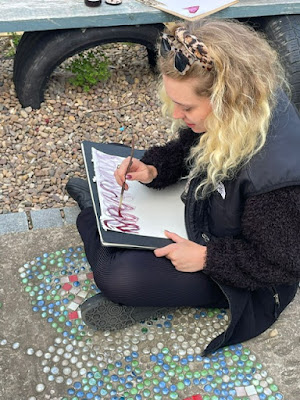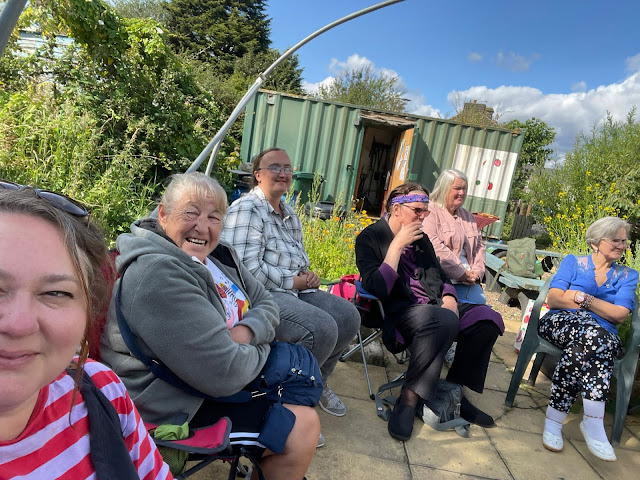As we steadily approach the Winter months and the Green UPLIFT calendar comes to a close, we’re reflecting on some of our UPLIFT highlights, one of which includes a fantastic allotment social with transdisciplinary artist, Hannah May Batley.
Hannah’s work centres around engaging with the ecologies of place through story-telling, foraging, herbalism, mark making and writing. The group got a wonderful introduction to this, making oak gall and elderberry ink, herbal vinegars and honey as well as foraging and discussing all things herbal lore and herbal medicine.
It was such an enriching day, UPLIFTER’s took a huge amount away from the session, feeling rooted and inspired.
We were so blown away by Hannah that we recently caught up with her to find out all about her relationship to Myths, Marks and Medicine:
For anyone who wasn't at the event can you give us an insight into your work & what it involves?
I would say the heart of my work is grounded in the act of remembering. Not, remembering in
the cognitive sense. But, re-membering in an embodied sense. My work is about re-connecting the body & the human with place, ancient practices of custodianship, making & self-care. My work is transdisciplinary. I am a transdisciplinary artist. By that I mean that I practice more than one art form, I am a writer, oral storyteller, singer, educator, community herbalist, forager & maker. I forage wild food, herbs & also natural pigment that I process into paint & ink using ancient processes. Usually, that's too much for folks to digest so what I usually say is my work focusses on Myths, Marks, Medicine.
Myths relate to
the stories I tell but, the word myth also has a wider implication when applied
to culture. As a storyteller I work directly with myth. As a writer, myth
informs my approach to poetry & prose.
Marks relates
to mark making. Growing up in a working class village in Barnsley I found it
very difficult to see myself as an artist. The word felt cumbersome in my
mouth. Other people were artists, not me. Mark making gets underneath the
elitism & gatekeeping involved in art. I believe humans are innately
creative. To live is to be creative. Making marks as a term removes the barrier
between me and the paper, it offers an invitation rather than a judgement. I
feel an invitation to mark making rather than art making is more accessible. It
encourages more engagement. So that's some context to why I choose to use that
language.
Alongside this,
mark making also refers to my pigment work. I paint using handmade natural
tools, inks & paint. I've had some of work exhibited in local exhibitions
& I've sold some of my art. Images of paintings can be seen on my
instagram: woman_ofthe_hedge.
Medicine relates to my herbalism practice. I've been practicing herbalism for 12 years now and am entirely self taught. In December I will start with Heartwood to study my formal qualification in Community Herbalism so I can go on to train as a Medical Herbalist. The plant & other-than-human world informs so much of what I do & how I teach. I believe plants are our allies & we can learn so much about being in the world when we re-connect with the eco-system that sustains us.
How did you get into this, how did it all come about?
In 2021 I had a
nervous breakdown, what led me to breakdown was addiction and the reporting of
a historic rape. Following the breakdown I went into a 12 step recovery
programme. In the early days of my recovery all I could do, all I wanted to do
was be outside. The world humans have created felt very overwhelming &
impenetrable to me. I'd quit my job, I was unemployed & I spent as much of
my time outdoors as I could. In the early days of my recovery I felt the roots
of the trees in West Yorkshire, where I live, held me when nothing else could.
In the weeks, months & years that followed my breakdown I forged a very
meaningful & deep relationship with the place I live. Through my 20's I
enjoyed time outdoors, enjoyed camping holidays, walks, hiking, wild swimming.
But, the relationship which emerged post breakdown was very different. Before I
started recovery I felt incredibly alienated from the world. I was profoundly
lonely. That's not to say I didn't have friends or family, I did. Friends and
family who love me & have stood by me. Thing is, I was too ill and too
scared to let any one in to my life. I held the world at an arms distance. I
would go to the woods for solace and quietness. A means to seek respite &
ground myself. I felt strongly about climate justice, protecting land &
access to land. But, on reflection I don't think I ever felt connected to
place, I never felt I belonged anywhere. I didn't know where home was.
My work was
born from the grief of rape & addiction. From being displaced from place
& body. It was born from seeking ways to restore and remedy the damage that
I had done to myself & what had been done too me.
Recovery gave
me more headspace, self-esteem & confidence. With that headspace, I began
focussing on my herbalism again. I started foraging more. Reading more. I
started painting again & writing again. All the things I'd neglected in my
illness slowly started re-emerging. I started feeling joy again, serenity &
a sensation of being full. Content.
Fortunately,
I'd qualified with a Postgraduate Diploma in Adult Education so I had the tools
to put what I was learning into a curriculum. I started archiving my ideas on
pedagogy, developing my own teaching practice. I researched and looked for
courses and books on how to skill up. I learnt more and enough to feel
competent to share with others.
In June last year I took the curriculum 'Rooting into Place' to Calderdale recovery college and I delivered the first series of the 'Rooting into Place' course. Since then, I've taken it into Universities, Rape Charities, Recovery Communities & Colleges.
I offer
community workshops too. My next one is called Callieach. Which is all about
Winter. I'll tell the story of the Callieach, an ancient Celtic goddess who
ruled the season of winter. We'll learn about herbs for women's health,
focussing on immune support, detoxifying & mental health. Then we'll learn
how to make our own watercolour from locally foraged natural pigment.
What does this work mean to you and why do you think it is important for our wellbeing?
When I quit my job one of the reasons, alongside being too ill to continue, was the idea that work is something separate from self. The idea that I could spend 37.5 hours a week doing something that I didn't care about contributed to exacerbation of my deterioration. I went to work primarily for money. Thing is, when I did that I numbed everything that roared against my doing that, day in day out. I numbed my creativity, my writing, my singing, my art. I numbed myself out to friendships and family. Work overwhelmed me. Emotionally, spiritually & physically. It gobbled up my time like a hungry ghost & with it my connection to Self. To place.
When I'm writing about what I do, I often refer to it as work because people find it more digestible. But, if I'm honest I don't see what I do as work and that was a deliberate, conscious choice. When I quit, when I had the breakdown I made a decision that I would never force myself to do what I did before. I would make compromises for sure, but none great enough that I would sever myself from place & self again. There is no amount of money worth my sanity. There is no job that is worthy in having so much of my time. I felt strongly that if the society I lived in needed me to earn money to live, I would do it on my own terms, doing what I love.
Today, I feel incredibly blessed for my breakdown. I feel blessed that I was forced to stop. It was in the pause that I found the things I loved and it wasn't that I found them anew, I re-discovered them underneath & amongst the debris of myself, beside all the things I was told I should do.
So, to answer your question this journey I've been on and will continue to be on is deeply meaningful. It holds the stories of my recovery, the pain, strength, experience & hope. It is as much apart of me as I am apart of it. To think about a reality where I'm not doing what I'm doing now, in some capacity invokes a sense of physical discomfort: a tightness in my chest, a shortness of breath, panic. How does a person measure importance? To me, the way I gauge what matters is through my bodies response. To be without this work causes me harm, puts my nervous system into a state of dysregulation. I can't speak for anyone else's wellbeing, I'm no expert on anyone else's story or what works for them. What's certain for me, is that my wellbeing is in symbiotic relationship with the work I'm doing. In the same way the moss needs the wood to survive, it would seem that I need creativity.







